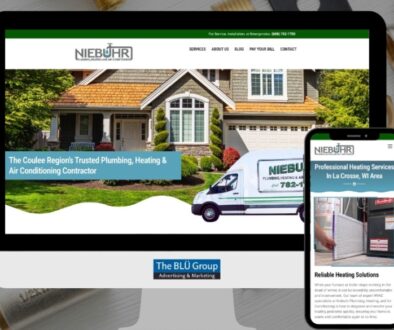6 Tips for Small Businesses That Need a Website
As we enter our 12th year of helping businesses with all aspects of their advertising and marketing programs, we receive a lot of e-mails and phone calls from local, small businesses needing help building their brand and increasing their bottom line. Understanding that every prospect and client is unique and deserves a customized plan that gives them the best chance for success given their goals, product/service, target audience, and budget, one thing almost every company needs is a website.
To help small business owners prepare for a meeting with a professional website company like The BLÜ Group, an online provider or a student (to save money), or even if you plan on taking this on yourself, below are 6 tips to get you started in the right direction.
1. Choose a Great Domain Name
Ideally your website domain name, i.e. FeaturesSportsBar.com, should be short, easy to type, contain keywords, target your geographic area if appropriate, be memorable, and represent your company. You will also want to consider purchasing variations of your domain name and different extensions (.com, .org, .info, etc.) to protect your brand and prevent your competitors from scooping them up. Domain names are very inexpensive so don’t be afraid to get as many as you can afford. Visit our online services provider, TheBlueKingdom.com, for the best deal on domain names.
2. Select a Hosting Provider
Hosting is a service provided by companies like GoDaddy.com and similar to domains, is very affordable. This is where your website will live and our clients usually don’t pay more than $10/month at TheBlueKingdom.com. If you work with a professional web services firm, they should be able to help you with this or take care of it completely for you as we do for our clients at The BLÜ Group.
3. Think About Your Site Map
What pages do you want to have on your website? What is on the home page? Do you want an “About Us” page? Other typical pages to consider include: Services, Products, Shop Online, Contact Us, and Social / Connect (for your social media pages). The total number of pages you have on your website will be dictated by how large your company is and what you have to offer. Keep in mind, the more pages you have with quality content, the better your search engine rankings will be so be sure to consider having a blog. Websites with low page counts do not do well on Google, Yahoo, etc.
4. Review Websites You Like
One way to ensure that you get a website that you like is to provide the people you are working with examples of websites you would like yours to mimic. At your initial meetings they should ask you specific questions about those websites to learn more about what it is you like, what you would like to see on your website, look and feel, and functionality. Always keep in mind that your budget will dictate a lot of what can be done so you may have to scale back your expectations or increase your budget. Also, depending on who you choose to work with, they may not have the talent or experience necessary to make your vision come true so be sure to request samples of their past work.
5. Develop Quality Content
Once you have your website mapped out, you have to decide who is going to be responsible for developing the content that is going to be on it. If you have a small budget you may have to be prepared to do it yourself. You are going to need descriptive, optimized copy and powerful images that showcase your products / services well. Business owners can do wonders with today’s cameras that come with their phones. Add in some inexpensive light boxes or a white sweep and you can create some nice images. Remember…this is your brand so be sure everything you do represents it in the way that embodies what it stands for, i.e. expensive jewelry should not look like it was shot by an amateur.
6. Make Sure Your Website is Mobile-Friendly
Website searches on an individual’s phone or tablet now outnumbers searches on desktop. If your website is not mobile-friendly you are missing out on potential new business and probably frustrating people that visit your website. In addition, last April Google changed their algorithm so that websites that are not mobile-friendly will rank lower than those that are. Our clients that decided not to update their websites accordingly noticed significant drops in their organic traffic due to this change. And while we’re on this topic, you are better off having a responsive website that looks and works well on desktop and mobile vs. a standard website AND a mobile-friendly version. There is a difference and it’s important to understand what they are. We have done it both ways at our agency depending on the needs of the client.
There are a lot of other things that go into developing a website such as making sure it is optimized for search engines and discussing what the on-going plan is for content creation, updates, blog posts, and SEO so be sure to discuss this with the people you are working with or research it online if you will be doing it yourself. And don’t forget to think about what you are willing to invest in this marketing tool. Be sure you tell your potential partner what your budget is so they don’t waste their time or put together a proposal that is unrealistic.
If you have any questions or are interested in partnering with a professional website design and development company, contact us at 608-519-3070.




